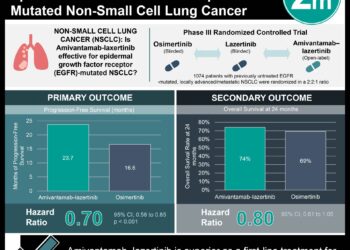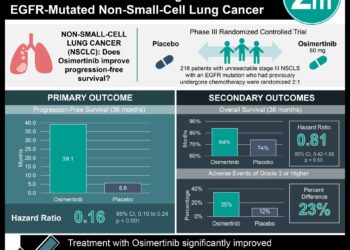Amivantamab and Lazertinib in Untreated EGFR-Mutated Advanced NSCLC
1. The progression-free survival between the amivantamab–lazertinib group (23.7 months) and the osimertinib group (16.6 months) had an HR 0.70.
2. Grade 3 or higher adverse events occurred in 75% of the amivantamab–lazertinib group and 43% of the osimertinib group.
Evidence Rating Level: 1 (Excellent)
Study Rundown: Osimertinib is the current first-line therapy in EGFR-mutated advanced NSCLCs, although resistance eventually develops. This trial assessed the efficacy of combining amivantamab, an EGFR-MET bispecific antibody, with lazertinib, a third-generation EGFR-TKI, compared to osimertinib alone for treating EGFR-mutated advanced NSCLC. The primary endpoint was progression-free survival (PFS) and secondary endpoints included overall survival (OS), objective response rate (ORR), duration of response (DoR), and safety. These endpoints had an emphasis on comparing amivantamab–lazertinib to osimertinib. Median PFS was 23.7 months in the amivantamab–lazertinib group vs 16.6 months in the osimertinib group, with HR 0.70 (significant). Median extracranial PFS was 27.5 months in the amivantamab–lazertinib group vs 18.4 months in the osimertinib group. The median PFS in the lazertinib group was 18.5 months. Median OS data was not mature, but OS at 18 and 24 months was 82% and 74% in the amivantamab–lazertinib group vs 79% and 69% in the osimertinib group, respectively. The HR for death was 0.80 (non-significant). ORR was 86% in the amivantamab–lazertinib group vs 85% in the osimertinib group. Median DoR was 25.8 months in the amivantamab–lazertinib group vs 16.8 months in the osimertinib group. With regards to safety, grade 3 or higher adverse events were reported in 75% of the amivantamab–lazertinib group vs 43% of the osimertinib group. Notable differences in all grade adverse events between the two groups included an increased rate of paronychia (68% vs 28%), rash (62% vs 31%), VTE (37% vs 9%), and infusion-related reactions (63% vs 0%), respectively. The strengths of this study included its sample size and methodology, and the limitations included its follow-up time. Overall, this study found that patients with EGFR-mutated advanced NSCLC had some improved outcome efficacy when treated with first-line amivantamab–Lazertinib compared with osimertinib.
Click to read the study in NEJM
Relevant Reading: Lazertinib Versus Gefitinib as First-Line Treatment in Patients With EGFR-Mutated Advanced Non–Small-Cell Lung Cancer: Results From LASER301
In-Depth [ randomized controlled trial]: This international phase 3 trial enrolled adults with previously untreated locally advanced or metastatic NSCLC with a common EGFR mutation (Ex19del or L858R) and randomized them (2:2:1) into amivantamab–Lazertinib (n=429), osimertinib monotherapy (n=429), or lazertinib monotherapy (216). There was double-blinding of the monotherapies. Most of the patients were women, were Asian or White, and had never smoked. The median follow-up was 22.0 months. Median PFS was 23.7 months (95%CI, 19.1-27.7) in the amivantamab–lazertinib group vs 16.6 months (95%CI, 14.8-18.5) in the osimertinib group, with HR 0.70 (95%CI, 0.58-0.85, p=<0.001). Median extracranial PFS was 27.5 months (95%CI, 22.1-NA) in the amivantamab–lazertinib group vs 18.4 months (95%CI, 16.5-20.2) in the osimertinib group. The median PFS in the lazertinib group was 18.5 months (95%CI, 14.8-20.1). Median OS data was not mature, but OS at 18 and 24 months was 82% (95%CI, 78-85) and 74% (95%CI, 69-78) in the amivantamab–lazertinib group vs 79% (95%CI, 75-83) and 69% (95%CI, 64-74) in the osimertinib group, respectively. The HR for death was 0.80 (95%CI, 0.61-1.05). ORR was 86% (95%CI, 83-89) in the amivantamab–lazertinib group vs 85% (95%CI, 81-88) in the osimertinib group. Median DoR was 25.8 months (95%CI, 20.1-NA) in the amivantamab–lazertinib group vs 16.8 months (95%CI, 14.8-18.5) in the osimertinib group. With regards to safety, grade 3 or higher adverse events were reported in 75% of the amivantamab–lazertinib group vs 43% of the osimertinib group. Notable differences in all grade adverse events between the two groups included an increased rate of paronychia (68% vs 28%), rash (62% vs 31%), VTE (37% vs 9%), and infusion-related reactions (63% vs 0%), respectively. Overall, this study found that patients with EGFR-mutated advanced NSCLC had some improved outcome efficacy when treated with first-line amivantamab–Lazertinib compared with osimertinib.
Image: PD
©2024 2 Minute Medicine, Inc. All rights reserved. No works may be reproduced without expressed written consent from 2 Minute Medicine, Inc. Inquire about licensing here. No article should be construed as medical advice and is not intended as such by the authors or by 2 Minute Medicine, Inc.







